Amethyst is more than a beautiful purple stone—it's long been a symbol of peace, clarity, and protection. But where do these meanings come from, and why do they still matter today? Let’s explore the story behind this timeless crystal.
From Greece to Tibet: The Deeper Path of Amethyst
Western Origins
The name amethyst comes from the Greek word amethysts, meaning “not intoxicated.” In ancient Greece, the stone was believed to prevent drunkenness, clear the mind, and sharpen judgment. Worn by warriors, priests, and nobles, it came to symbolize self-control, clarity, and spiritual awareness.
Arrival in Tibet
Although amethyst is not naturally found in Tibet, it began reaching the region around the 7th century CE, when Buddhism spread from India through Nepal and into the Himalayan plateau. Along the southern route of the Silk Road, gemstones and sacred objects were traded and carried by pilgrims and monks. Amethyst, with its tranquil and focused energy, was soon adopted by Tibetan practitioners as a support for meditation, prayer, and spiritual discipline.
Spiritual Harmony
In Tibetan Buddhism, the color purple represents wisdom, emptiness, and spiritual transcendence. It is often seen in mandalas and visualizations of advanced deities. While amethyst was not part of the original Tibetan tradition, its quiet, introspective energy naturally resonated with the values of stillness, clarity, and detachment.
Rather than being worshipped for its own sake, amethyst became a subtle tool in spiritual practice—a way to focus the mind, purify intention, and move closer to the experience of emptiness itself.
The Role of Amethyst in Modern Spirituality
In today’s fast-paced, emotionally overstimulated world, many people are seeking something steady—a spiritual anchor to restore inner balance and clarity. Amethyst, long associated with stillness, purity, and awareness, has found a new role in modern spiritual life.
Meditation and the Third Eye
Amethyst is often linked to the third eye chakra, also known as the brow chakra. It’s believed to enhance intuition, clear mental fog, and help the mind enter a meditative state. Many practitioners place amethyst on the forehead or hold it during meditation to deepen focus and quiet distraction.
Emotional Support in Everyday Life
Beyond formal practice, amethyst has become a source of emotional comfort in everyday settings. People use it to relieve stress, improve sleep, and promote calm. Whether placed beside the bed, on a desk, or worn as jewelry, it serves as a small but steady reminder of peace and presence.
A Personal Ritual for the Modern World
To many, amethyst is more than a crystal—it’s a way to reclaim ritual in daily life. You don’t need incense or mantras; sometimes, all it takes is a quiet moment holding the stone, letting your mind settle. In that stillness, amethyst becomes a gentle doorway back to yourself.
Practical Benefits of Amethyst
Amethyst carries centuries of spiritual symbolism, but in everyday life, it serves as a quiet support for many. From calming the mind to cleansing energy, its value goes far beyond appearance.
A Natural Frequency for Calm and Clarity

Amethyst is widely believed to promote emotional balance and mental clarity, making it ideal for high-stress spaces. Placed in work areas, reading nooks, or bedrooms, it helps ease anxiety and restore inner stillness.
Sleep Support and Daily Relaxation

Many people keep a small amethyst near their bed or carry it with them during the day. Known as the “stone of sleep,” it is especially helpful for those struggling with restless thoughts or nighttime unease.
A Symbol of Protection and Energy Purity

Beyond relaxation, amethyst is seen as a symbol of emotional shielding and energy cleansing. Whether in the form of towers, spheres, raw stones, or jewelry, it represents balance, clarity, and quiet inner strength. Worn close to the body, it acts like a soft energetic boundary.
How to Use Amethyst in Daily Rituals
The power of amethyst doesn’t lie in complex rituals—it lies in the quiet moment you choose to pause and connect with yourself. Even a few minutes can bring calm and clarity into your day.
As a Focus Tool in Meditation

Hold amethyst in your hand during meditation, or place it gently on your forehead or heart center. Its grounding energy helps deepen your awareness and makes it easier to settle into stillness.
A Bedside Companion for Rest

Place amethyst beside your bed or under your pillow to signal the end of the day. Paired with slow breathing or mindfulness, it encourages a smoother transition into restful sleep.
For Space Clearing and Energetic Boundaries

Keep amethyst in areas where you work, reflect, or gather. It acts like a gentle emotional filter. You can also wear it or place it alongside other stones as a quiet form of energetic protection.
Let Your Intention Lead
Each day, take a moment to touch the stone—or speak a quiet intention to it. You don’t need elaborate words. What matters is your presence. Amethyst responds not to noise, but to care.
So what does amethyst really reveal?
Not answers—but presence. In its stillness, it reflects your own. Whether for clarity, healing, or peace, its meaning begins the moment you choose to listen.
























